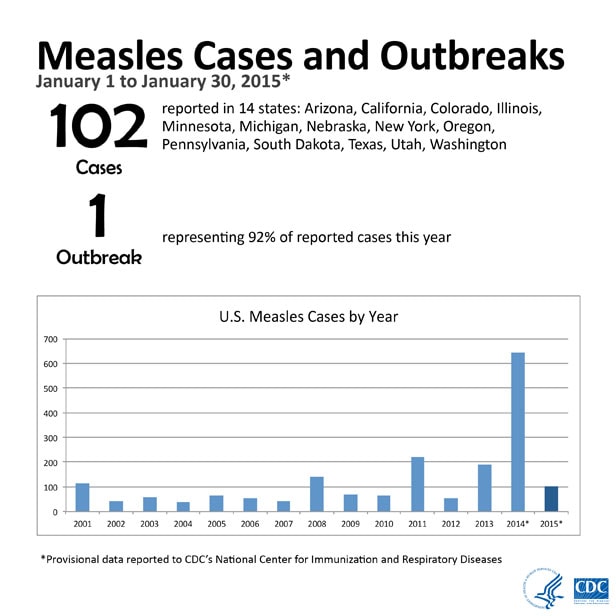This is a post I wrote for a mom’s group I’m part of, because a lot of moms were asking for clarification of CDC guidelines or an easy to understand explanation.
Disclaimer: This is not medical advice. I am not a medical professional. I’m a concerned mom who has a medically fragile child. I want to share with other parents the tools that our doctors, specialists, and lots of research have given me. Any questions regarding viruses like the measles and immunizations should be directed to your primary physician.
Measles is an extremely contagious respiratory virus usually accompanied by a rash. In the last few years, the number of cases has gradually risen, with 2014 having three times the number of cases as the previous years, the largest number of cases since the disease was considered eliminated.

(Sources: CDC http://www.cdc.gov/measles/cases-outbreaks.html http://www.cdc.gov/measles/about/faqs.html#measles-elimination)
Symptoms:
The symptoms of measles generally appear about seven to 14 days after a person is infected.
Measles typically begins with
- high fever,
- cough,
- runny nose and
- red, watery eyes (conjunctivitis).
(Source: CDC http://www.cdc.gov/measles/about/signs-symptoms.html)
It is a fairly mild virus, if you are a healthy individual, with complications that range from mild to severe. Those most likely to experience complications are those under age 5, and those over age 20. Complications can include ear infections, diarrhea, pneumonia, encephalitis (infection of the brain), and can cause blindness in severe cases.
Those who are immunocompromised are at risk for developing severe complications at a much greater rate than those who are generally healthy. From the CDC “Measles in an immunocompromised person may be severe with a prolonged course. It may occur without the typical rash, and a patient may shed virus for several weeks after the acute illness.” (Sources: http://www.nhs.uk/Conditions/Measles/Pages/Complications.aspx http://www.cdc.gov/vaccines/pubs/pinkbook/meas.html#complications)
The CDC has released a health advisory addressing the most recent outbreak:
Measles is a highly contagious, acute viral illness. It begins with a prodrome of fever, cough, coryza (runny nose), conjunctivitis (pink eye), lasting 2-4 days prior to rash onset. Measles can cause severe health complications, including pneumonia, encephalitis, and death. Measles is transmitted by contact with an infected person through coughing and sneezing; infected people are contagious from 4 days before their rash starts through 4 days afterwards. After an infected person leaves a location, the virus remains viable for up to 2 hours on surfaces and in the air. (Source: http://emergency.cdc.gov/han/han00376.asp)
All this is going to cause many of us a lot of concern. But what does it mean for us? For those of us who are healthy? Who are immunocompromised? Who have someone in our families fighting cancer, or chronic illness?
The most effective way to avoid contacting the measles is to get vaccinated. The vaccine is one of the MOST EFFECTIVE vaccines in the world. (Sources CDC: http://www.cdc.gov/measles/vaccination.html, WHO: http://www.who.int/mediacentre/factsheets/fs286/en/)
Quote from CDC:
In the United States, widespread use of measles vaccine has led to a greater than 99% reduction in measles cases compared with the pre-vaccine era. From 2000 to 2013, a range of 37 to 220 measles cases per year were reported in the United States, and most of these originated outside the country.
Measles is still common in other countries. The virus is highly contagious and can spread rapidly in areas where people are not vaccinated. Worldwide, an estimated 20 million people get measles and 122,000 people die from the disease each year—that equals about 330 deaths every day or about 14 deaths every hour.
CDC Guidelines for Vaccination:
Children
CDC recommends all children get two doses of MMR vaccine, starting with the first dose at 12 through 15 months of age, and the second dose at 4 through 6 years of age. Children can receive the second dose earlier as long as it is at least 28 days after the first dose.
*Note: A child CAN get an MMR shot before 12 months of age, as early as 6 months, but they are still recommended to get the two-dose series– one dose at 12 through 15 months of age and another dose at least 28 days later. Source: CDC Recommendations for International Travel: http://www.cdc.gov/measles/travelers.html
,**Note: Sometimes an infant who is immunized has a less-complete immunity to the disease being vaccinated. This is generally called primary vaccine failure, and is most often caused by the antibodies the baby is receiving from the mother, called passive immunity. This immunity goes away, usually around 6 months, but a child who is breastfed will be passively immune longer (therefore having an ineffective immune response to the vaccine), and this is the main reason the MMR vaccine is recommended between 12-15 months of age. Mothers with a naturally occuring immunity to measles (as opposed to a vaccinated immunity) are also more likely to have a child with a stronger passive immunity. (http://www.nhs.uk/chq/Pages/939.aspx?CategoryID=54; http://www.ncbi.nlm.nih.gov/pubmed/14646978)
Students at post-high school educational institutions
Students at post-high school educational institutions who do not have evidence of immunity against measles need two doses of MMR vaccine, separated by at least 28 days.
Adults
Adults who do not have evidence of immunity against measles should get at least one dose of MMR vaccine.
Who is not able to be vaccinated?
Short answer? No healthy individual is unable to be vaccinated. Long Answer? Some people will not be protected by vaccines (those with gene deletions or duplications which cause their bodies to not develop antibodies), or are too medically fragile to receive a vaccination. Those individuals rely on herd immunity to be protected from communicable diseases. Talk to your doctor if you are concerned about whether or not you or your child is able to be vaccinated.
But what do I *DO* now that measles has come to Fresno?
Are you vaccinated? Are your children (age 1 year or older) partially vaccinated? If so, there is VERY little chance of you contacting the illness. However, infants, pregnant women (due to suppressed immune systems), immunocompromised people, and the elderly are all more at risk; so stay away from large groups of people if you have one of the at-risk in your home.
Support the immune system (Vitamins A, D, B12, C, vegetables–especially the dark greens and rich orange veggies, sitting in the sun, getting good sleep) is the best way to keep your bodies healthy. Wash your hands. Sanitize your house using lysol or bleach dilute if you have a group of people over. Avoid public places if you are in the risk group. If your child is at risk (unvaccinated or medically fragile), consider keeping them home from school, church, and activities where they would be in a group of people.
FAQs friends have asked me:
What is the vaccine for measles?
It’s called the MMR, a combined vaccine with attenuated measles, mumps and rubella viruses. A two-dose series, the first given between 12-15 months of age, and the second between 4-6 years. A second dose can be given 28 or more days after the initial dose. (MMR Vaccine Information Sheet: http://www.cdc.gov/vaccines/hcp/vis/vis-statements/mmr.html)
Is it the same as the chickenpox vaccine?
No. The chicken pox vaccine (varicella) is a single shot vaccine. There *IS* a combined MMRV vaccine with the chickenpox added to the MMR, so check with your doctor if that is the one your child received. (MMRV Vaccine Information Sheet: http://www.cdc.gov/vaccines/hcp/vis/vis-statements/mmrv.html)
Are measles and chickenpox the same disease?
No. Chickenpox (Varicella) is also virus that causes a rash, but it does not have the severe complications measles can have. The rash may look similar, but the viruses are very, very different.
What do I do when my child is vaccinated?
When a child is vaccinated, they are often given a weakened version of the virus (called an attenuated virus), which allows their immune system to respond to the virus and develop the antibodies against it. Because their immune system is “working” it is highly recommended they stay home for a week (the typical time it takes for an immune system to have the initial response), because they are susceptible to catching something else during this time. Because the MMR is an attenuated virus, it also means the individual is potentially contagious after the shot for a short period of time. It is *not* the same as the full-on-measles virus, it is called viral shedding, and is much less contagious–and usually only through large amounts of bodily fluid, and generally only to those who are at-risk for the scary complications from the measles. Giving yourself, or your child, a week at home will assist in protecting those in your circle who are at-risk for contracting the measles.
I’m not sure I’m vaccinated. What can I do?
Talk to your doctor about requesting a titer; a blood test that checks for antibodies to known vaccinated diseases. You can check for any number of things, from chickenpox to measles to hepatitis. If your antibodies are not high enough, you can get the MMR shot as an adult (see steps on lowering risk of sharing a shedding virus with others above).
I’m pregnant. What can I do about the measles?
You too can get the titer, to check for your antibodies. If your antibodies are high, your immune system is protecting you from the virus. If you are unvaccinated and pregnant, it is NOT recommended you get the vaccine. It is also recommended any adult who gets the vaccine to wait 4 weeks (28 days) before getting pregnant.
My best friend’s son is immunocompromised, how should I deal with that?
First,as with ANY virus, inform your friend if you have any symptoms (cold, fever, runny nose) even if it’s not the measles. Let your friend control how she is going to protect her son. If she declines having her son hang out with your child(ren), do not feel hurt. Realize she has to deal with much more than just worrying about him getting the measles. After all, the measles itself is fairly mild, it’s the complications that are scary. Inform your friend if you don’t vaccinate, or if you have been at the place(s) a known measles patient was at. For some children, a simple cold virus is just as deadly as the measles is to a typical child.
Further Reading:
http://www.cdc.gov/vaccines/ed/ciinc/downloads/2014-05-22/Wallace-measles.pdf
http://www.wired.com/2015/01/vaccinated-people-get-measles-disneyland-blame-unvaccinated/ which is also a good written explanation of herd immunity, for those wondering.
Here’s a good youtube.com video explaining herd immunity visually: https://www.youtube.com/watch?v=ZuiHFg_nfnE.
More reading from the CDC on who should not get the vaccine: http://www.cdc.gov/vaccines/vpd-vac/should-not-vacc.htm#mmr

Trackbacks/Pingbacks